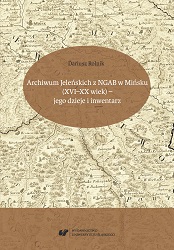Archiwum Jeleńskich z NGAB w Mińsku (XVI—XX wiek) — jego dzieje i inwentarz
The Archives of the Jeleński family from the National Historical Archives of Belarus in Minsk (16th—20th century) — its history and inventory
Author(s): Dariusz Rolnik
Subject(s): History, 18th Century
Published by: Wydawnictwo Uniwersytetu Śląskiego
Keywords: Lithuania; Jeleński family; nobles of the times of Stanisław August; archival inventories
Summary/Abstract: The main part of the present publication is constituted by the Archives of the Jeleński family from the National Historical Archives of Belarus in Minsk. It seems that the implementation of this project will considerably facilitate using the aforementioned complex of archives, as the existent and accessible inventory of this archive in Minsk in fact only provides information about former signatures, and — in an obscure and frequently erroneous manner — about its contents. The way of presenting the Archives of the Jeleński family as suggested here will allow the researcher to familiarize quickly and certainly with its content, while the first part of the present study will facilitate the reading of this archive as well as the appropriate decoding of the senders and recipients of the messages, which is particularly important in case of reading the correspondence contained in the archive. Moreover, what is even more important, the archive will thus be introduced into the scientific circle. Despite the fact that this particular archive is not the most significant one for the purpose of studying the history of the former Republic of Poland, it nevertheless has some significance for the studies on the functioning of its provinces. The information contained in the archive may facilitate to explore the past times of the Saxon and Stanislavian age, and the history of the first half of the 19th century, exhibiting completely new matters, or showing the old ones in a new perspective.
The material of the archives of the Jeleński family, including the correspondence contained there, apart from few fragments does not revolutionalize the image of the Lithuanian province of the Stanislavian times; in some periods, however, it makes it more precise and elaborate, demonstrating the whole context of the functioning of the Lithuanian province, as can be exemplified by the Minsk, and sometimes by the Novogrod voivodeships, and most of all by the lands of the Mozyrski district, to which the majority of the information contained in the archives refers. It constitutes a good exemplum for demonstrating the mechanisms of exercising power. The material of the archive also demonstrates an important quality of the gentry of the Stanislavian epoch, namely its concern with own interests. Economic issues related to the Jeleńskis’ possessions are mentioned in almost every unit. Disregarding the essence of the correspondence between the Jeleński family and their land stewards and plenipotentiaries responsible for their household affairs, attention must be paid to the correspondence which the members of the family carried on with one another, in which public issues were rarely taken up. In the letters that were exchanged among the members of the house, the dominant problems were common economic, contractual, and procedural matters.
The main part of this study is preceded by introductory chapters. They contain basic information concerning the Jeleński family. They reveal the power of the family, and allow to rank this family among the Lithuanian elite, but primarily these chapters are meant to be the aid in reading the archives’ inventory. They may, after all, facilitate the appropriate reading of the letters that are comprised in this file, chiefly with respect to their receivers and senders. This part of publication also contains a brief history of the Archive of the Jeleński family and a short description of its resources. Also, the chapter provides the principles of the structuring of the inventory and of the editing of its contents. Moreover, it points out to the most valuable materials which can be found in the archive.
Series: Historia
- E-ISBN-13: 978-83-226-3428-8
- Print-ISBN-13: 978-83-226-3427-1
- Page Count: 510
- Publication Year: 2018
- Language: Polish
- eBook-PDF
- Table of Content
- Introduction

